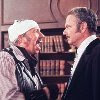
*
*
*
*
(photo: Slim Pickens and Harvey Korman, in Blazing Saddles, with books in background)
*
*
*
*
*
*
*
Well, if you're in Memphis, you pretty much have to visit Graceland. I'm in Memphis, so I visited Graceland.
A "modest mansion" is an oxymoron, but I think the phrase fits Elvis's home, which he decorated immodestly. Actually, the place is probably decorated just the way most young working-class men in the 1950s-through-early-1970s would have decorated a place if a) they suddenly obtained a great deal of cash, b) were under no one's guidance, and c) were egged on by a bunch of "pals"--or hangers-on.
My second impression concerns just how much cash the site generates. The scale of the operation is difficult to fathom. It is a massive cash-machine. I do wish a significant percentage of that money were dedicated to not-for-profit aims, particularly in Memphis, to address poverty, educational needs, and even basic infrastructure-problems. That would be a good thing, such channeling.
On the tour of the larger airplane, I learned that Elvis liked to read and traveled with boxes of books. What exactly he read is unclear, but one site on the web points to some of his spiritual reading: http://www.bodhitree.com/booklists/elvis.presley.html
However, in the mansion, at least on the ground floor, there appears to have been no space for books. The scholar and bibliographer in me would love to acquire lists of books Elvis read. What was in those boxes he toted to Las Vegas? As a reader, he probably had the same habits, if not the same classical education (Humes High School v. Pembroke College, Oxford, so it goes) as Samuel Johnson, including impatience. Johnson famously tossed books across the room when he became bored with them, and one imagines the nervous, pharmaceutically sped-up Elvis reading voraciously but getting bored fast. Cat on a hot tin roof, so to speak. Go, cat, go.
I also learned that among Elvis's favorite movies to watch on the plane were Blazing Saddles and the Monty Python films. This confirms that Elvis had great taste in cinema, at least in the comedy column. Of course, as with the home-decoration, the taste in comedies also betrays a bit of male adolescent bias. As clever as Brooks and the Monty Python team are, they're also mischievous in an adolescent way.
Most of Elvis's own movies are (as you know) bad, sometimes so bad they're campy and good, but that was Hollywood's and the Colonel's fault. Elvis was actually a good instinctive actor, as Walter Matthau once observed. He worked with Elvis in King Creole, and he said that after a scene, the director told him (Matthau) to stop trying so hard, and Matthau was aware of the extent to which Elvis wasn't trying hard but had a good sense of timing. One imagines all the good, surprising, interesting movies Elvis might have made. Too bad he didn't collaborate with the Monty Python troupe early on. Too bad Samuel Johnson never got to visit Graceland.







